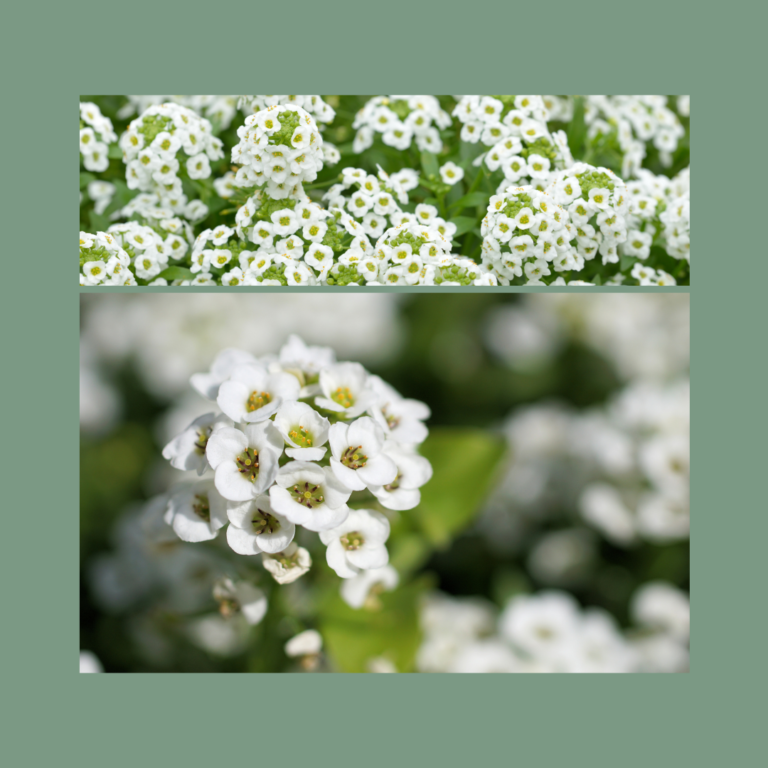
“Sweet alyssum (Lobularia maritima) is an annual native to the Mediterranean area which is popular with modern gardeners.
“The plant is low growing, about 20 cm tall, with dense clusters of tiny flowers in white, lavender or pink and a sweet scent.
“Other Names Sweet alyssum, Sweet Alison, madwort, healbite, sweet Alice, seaside lobularia, gum alison and Mary’s cushion.
“Alyssum has a rich history and folklore, with mentions dating back to ancient times, where it was associated with love and protection.
“This resilient plant can be easily propagated through both seeds and cuttings, making it a favorite choice for gardeners.
“Alyssum is renowned for its magical attributes, believed to bring luck, happiness, and ward off negative energy when placed in the home or garden.”
“With its healing attributes, Alyssum is known for its anti-inflammatory properties and has been traditionally used to alleviate respiratory issues and skin conditions.” Magickal Spot
| Variety | Description |
|---|---|
| Sweet Alyssum | Also known as Lobularia maritima, it is a low-growing annual with clusters of tiny, fragrant flowers. |
| Basket-of-Gold | Also known as Aurinia saxatilis, it is a perennial with bright yellow flowers and gray-green foliage. |
| Carpet of Snow | A popular variety with abundant white flowers, often used as a ground cover in garden beds and borders. |
| Easter Bonnet | A compact variety with delicate pink, purple, or white flowers, suitable for containers or small gardens. |
Magickal Spot

Basket of Gold – Perennial – Heirloom
Image Credit: Eden Brothers
Grow Heirloom Alyssum – Plant Basket of Gold Sweet Alyssum Seeds
“This delightful alyssum is an early spring bloomer that will add dazzling golden yellow blooms to your garden. An excellent choice as a colorful groundcover or along borders and fences. Plant Alyssum Basket of Gold in either sun or partial shade virtually any time throughout the season.” Eden Brothers

Easter Bonnet Alyssum
Image Credit: Eden Brothers
“As one of our earliest spring bloomers, Alyssum Easter Bonnet Mix produces darling mounds of low-growing clusters, boasting both color and fragrance. With such a long blooming time, our Easter Bonnet Mix is the perfect ground cover or garden border. Its sugary sweet fragrance packaged in doll-sized bouquets comes in a mix of shades from cream and pink to deep magenta. Expect to see blooms spring through fall. Though an annual, Alyssum is known to reseed heavily.” Eden Brothers 
Sweet Alyssum – Carpet of Snow
Image Credit: Eden Brothers
“This plant was regarded by the Neapolitans [Naples, Italy] as possessing magic qualities, and was suspended in their houses as a charm against the Evil Eye. Its name Alyssum is derived from the Greek a, not, and lussa, madness. In England, the plant was called Alisson and Madwort, because, as Gerarde says, it is “a present remedie for them that are bitten of a mad dog.”
What Is the Evil Eye?
“The evil eye is a superstition that a malicious or envious look can curse someone with bad luck, misery, or even injury or death. The belief in the evil eye is ancient and has been found in many cultures, including Greek, Roman, Jewish, Islamic, Hindu, and Buddhist.
“The evil eye is based on the idea that people who are successful, beautiful, or wealthy are more likely to attract jealousy, which can manifest as a curse. The power of the evil eye is sometimes thought to be involuntary, but it’s more often believed to be caused by malice or envy.
“EVIL EYE (עַיִן רָעָה, evil eye). An eye that is supposed to be capable of harming, or even killing, living beings by looking at them. The damage may or may not be intended by the owner of the eye. This belief was widespread in ancient times and has continued up to the present, although it seems never to have spread to the western hemisphere.
“Methods of defense against effects of the evil eye included the wearing of charms (the camels’ ornaments of Judg 8:21, according to some), repeating of oaths, and obscene gestures. A person might be held in suspicion of evil intentions if observed watching children or farm animals. The effects of the evil eye were believed to be rooted in envy so that when one expressed his admiration for animals or children he would often say, “God bless them” or its equivalent, so that his motivations would not be questioned.
“In the OT the phrase seems to denote the quality of stinginess, referring to the man or his action, without reference to magical power. In Deuteronomy 15:9, “thine eye be evil against” (KJV) might just as well be tr. “you are selfish toward.” Likewise, “his eye shall be evil toward” (KJV) means “he will act selfishly toward” (Deut 28:54, 56). The contexts indicate that those referred to refused to share with others who had less. Selfishness also fits the context of Proverbs 28:22, describing one who “hastens after wealth.” In Proverbs 23:6 the context allows the RSV tr. “stingy.” Selfishness or envy is the apparent meaning in Matthew 20:15 and may possibly be related to the situation in Matthew 6:22, 23 and Luke 11:34.” Encyclopedia of the Bible
Bibliography F. T. Elworthy, The Evil Eye (1895); HERE, V (1912), 608-615; S. Thompson, Motif-Index of Folk-Literature, II (1956), D 2071.
Discover more from Jacki Kellum
Subscribe to get the latest posts sent to your email.